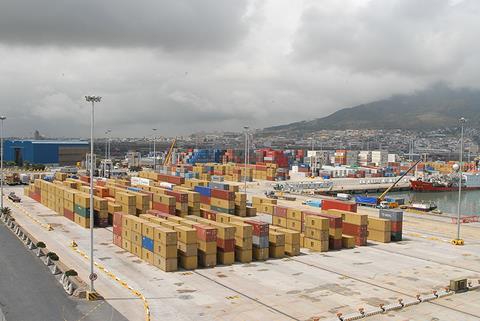Early grape exporters consider alternative shipping options to Cape Town’s container terminal as Maersk clarifies its position on using the South African port
Shipping giant Maersk has clarified its position on the inclusion of Cape Town on its schedules following congestion at the South African port.

Reports over the past weekend suggested that due to the delays, Maersk had decided to remove Cape Town as a port of call. Instead, it was reported that cargo for Cape Town would in future be discharged at Port Louis in Mauritius.
“I just wanted to clarify that we have not removed Cape Town from our services,” said Adhish Alawani, media relations manager, Indian Subcontinent, Middle East & Africa, in response to Eurofruit inquiries. “In fact, we have started a weekly feeder service from and to Cape Town. So, we do not compromise our customers’ requirements from Cape Town.”
Meanwhile, it is reported that logistics service providers are considering using Walvis Bay in Namibia for Namibian and Orange River grape shipments.
This follows news that specialised reefers will load grapes from Namibia and the Orange River, along with South African stonefruit, for shipment to the UK and Europe, at Cape Town’s main port from this weekend in what will become a weekly shipping programme.
This seems to indicate that the South African export industry does not have much hope that the problems in the country’s container terminals will be resolved quickly.
Alawani referred to a formal Maersk statement on its schedules to Cape Town and South Africa. It records South Africa as an extremely important market for Maersk and a strategic location for operations.
“We are committed to serving our customers here in the best way possible,” he said, “and supporting the economy by enabling global trade.”
The statement from Maersk read: “In recent times, we have experienced longer waiting times to berth at the ports, leading to increased operating costs. For example, if a vessel waits for seven days to berth, we must add one more vessel to the rotation so that the weekly service is maintained. Then there are additional fuel expenses, which are not only a cost point but are also not sustainable.
“To ensure that we can find the best solutions for our customers and the trade taking place in and out of South Africa, we are collaborating with the authorities and the rest of the ecosystem. We have started a weekly service from Cape Town that allows cargo movement in and out of the port to global trade routes through transshipment.”
The crisis at South Africa’s ports has reached new levels of congestion, with reports indicating that Durban harbour has thousands of containers stranded on ships. According to Transnet, there are more than 60 ships anchored at the Port of Durban, and it will take 7-15 weeks to clear these vessels. The state-owned entity said that 20 of the 63 ships docking in Durban were meant to head to Durban Container Terminals (DCT) Pier 1 and Pier 2.



